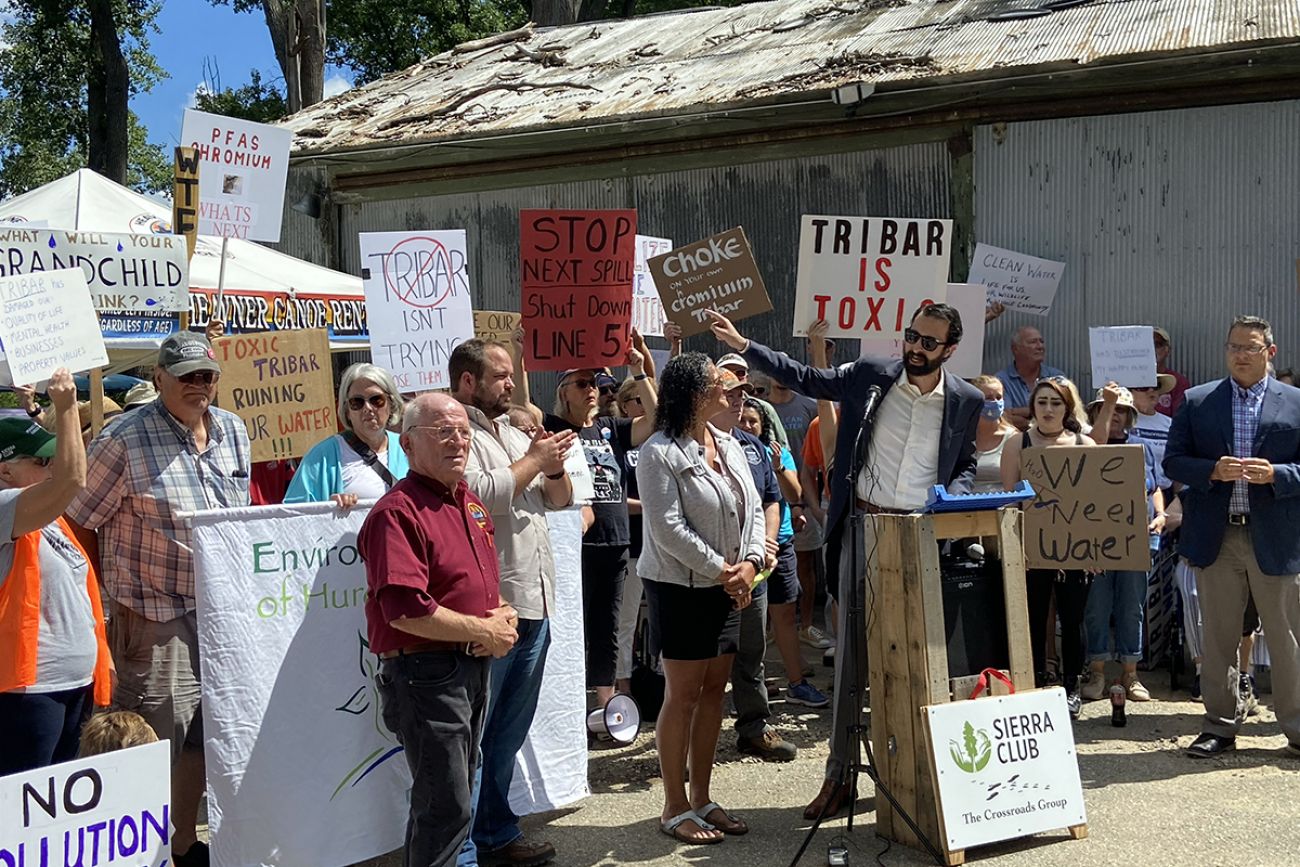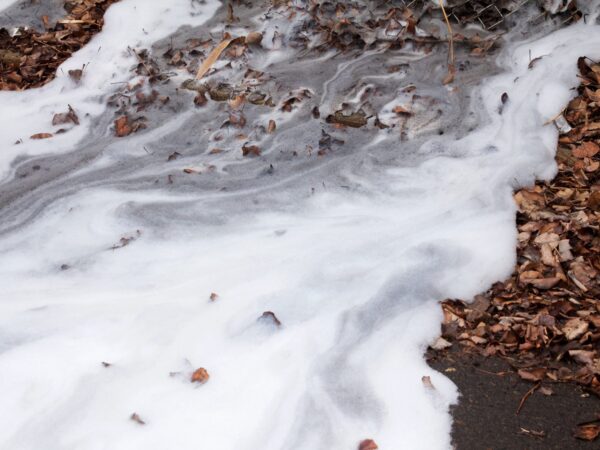
By Kelly House, Bridge Michigan
The Great Lakes News Collaborative includes Bridge Michigan; Circle of Blue; Great Lakes Now at Detroit Public Television; and Michigan Radio, Michigan’s NPR News Leader; who work together to bring audiences news and information about the impact of climate change, pollution, and aging infrastructure on the Great Lakes and drinking water. This independent journalism is supported by the Charles Stewart Mott Foundation. Find all the work HERE.
- State regulators issue multiple violation notices to Tribar Manufacturing
- They say Tribar staff ‘ignored’ hundreds of alarms as chromium flowed into city sewers
- EGLE vows to seek ‘full cost recovery’ from the company
Michigan regulators have issued multiple violation notices to the Wixom auto supplier whose release of thousands of gallons of chromium-containing liquid into local sewers sparked ongoing warnings not to touch the water on the Huron River.
In a series of violation notices to that raise new questions about the events at the Tribar Manufacturing plant beginning on Friday, July, 29, regulators indicate that on-site alarms were overridden 460 times between 4:59 p.m. and 7:46 p.m. that night — a period when the plant was not in production and “no one should be at the facility.”
“Why was a wastewater operator in the facility, unsupervised, during the weekend of Friday, July 29, 2022, to Monday, August 1, 2022?” Michigan Department of Environment, Great Lakes and Energy Water Resources Division Director Teresa Seidel asked in a Tuesday letter to Tribar.
The violation notices cover both water and air quality offenses, and agency officials said they will seek “full cost recovery” from the company.
EGLE spokesperson Jill Greenberg said Tribar officials have not sufficiently answered investigators’ questions about the release. Though the agency’s investigators have both criminal and civil authority, Greenberg declined to speculate on whether the spill involved criminal activity.
“We have been asking questions since the beginning, and Tribar has not answered them as we would like,” Greenberg said. “And so that’s why we issued this violation notice, demanding answers.”
Among the water quality violations tied to the spill, regulators flagged Tribar’s failure to immediately notify the department after discovering the chemical release. Regulators have said the company reported discovering the spill several hours before disclosing it to EGLE regulators on the afternoon of Aug. 1.
But a state violation notice indicates the release itself began days earlier, on the night of Friday, July 29.
A second EGLE spokesperson, Hugh McDiarmid, said the company had determined days earlier that the plating liquid contained in a 15,000-gallon tank was no longer usable, and the product was slated for disposal. That process typically involves adding chemicals to neutralize hexavalent chromium, converting it into a safer substance.
It’s unclear how far that process had proceeded by that Friday evening, when the release apparently began.
A violation notice issued to the company asks for a chronology of events before the release and information about plant personnel’s actions on the night of July 29, while asking a host of other questions about the circumstances surrounding the release.
EGLE also cited Tribar for the release itself, saying it violated state environmental law. Lastly, regulators said the company failed to properly update its Pollution Incident Prevention Plan and prove it’s in compliance with other state rules related to pollution spills.
Tribar has until Aug. 20 to respond to the water quality notices and answer state regulators’ questions about circumstances surrounding the release, according to a state announcement of the violations.
“Repeated requests by EGLE investigators for this critical information have not been adequately addressed by Tribar,” the release states.
State regulators are still investigating the cause of the spill.
Tribar issued a statement Wednesday saying the company is reviewing the violation notices while conducting its own internal investigation. The employee involved in the alarm overrides “is no longer employed by our company,” according to the statement. Tribar said it plans to share a report on its findings Thursday.
“Tribar has invested millions of dollars in sophisticated environmental controls to prevent an accidental release of wastewater prior to treatment at our facility,” said the statement, released through an outside public relations firm.
“Based on an initial investigation, those automated controls were all functioning properly at the time the plating solution was released to the wastewater treatment plant. However, the controls were repeatedly overridden by the operator on duty while the facility was shut down for the weekend. That individual is no longer employed by our company, and we are in the process of further improving our internal controls to prevent a future occurrence.”
EGLE’s violation notice asks for information from an Aug. 1 exit interview with an employee, which the agency named.
In response to Bridge inquiries, Tribar, through a spokesperson, said the employee’s manager did not know the employee was onsite after hours when the release occurred. The employee resigned that Monday, Aug. 1, after being questioned by human resources, the company said.
Asked whether company managers had the ability to be notified remotely when alarms went off, Tribar said no, “However, Tribar is in the process of updating its controls to notify management quickly and to put in place other controls to prevent any attempt to override an alarm that could lead to an event like this reoccurring.”
While the probe continues, regulators continue to advise residents not to come into contact with a section of the river between North Wixom Road in Oakland County to Kensington Road in Livingston County.
The separate air quality notices follow a July 21 inspection at the facility, more than a week before the spill. During that inspection, regulators found insufficiently controlled metal tanks that may have led to nickel and chrome air emissions, poor record keeping to prove the company’s compliance with the terms of its air permits, and equipment operations failures. Tribar has until Aug. 30 to respond to those violations.
Residents angered at the company’s pollution gathered Wednesday at Heavner Canoe & Kayak Rental in Milford to call for stiff consequences for Tribar, and tougher industrial pollution laws in Michigan.
Chants of “shut them down!” reverberated as protesters held signs declaring “Tribar has destroyed my happy place” and “our water is not your dumping ground.”
“I want them sued into oblivion,” Rep. Yousef Rabhi, D-Ann Arbor, told the crowd gathered at the event. “Why should taxpayers have to clean up the mess that some company made?”
The livery’s owners, meanwhile, expressed hope that the river could soon reopen for recreational use, after chromium turned up in just three out of 144 water samples taken from the river.
“Part of the beautiful Huron River remains open for recreation and for business,” said Bruce Heavner, the livery’s co-owner, noting that areas upstream of his livery are outside the current closure zone.
Catch more news at Great Lakes Now:
Reports: Huron River largely dodged hexavalent chromium scare
Anger, uncertainty and a race for answers in Huron River chromium spill
Featured image: Politicians, activists and residents rallied Wednesday in Milford, demanding accountability after Tribar Manufacturing’s latest pollution scare in the Huron River. Regulators have given Tribar until Aug. 20 to respond to a series of violation notices tied to a release of hexavalent chromium into sewers leading to the Huron River. (Bridge photo by Kelly House)




